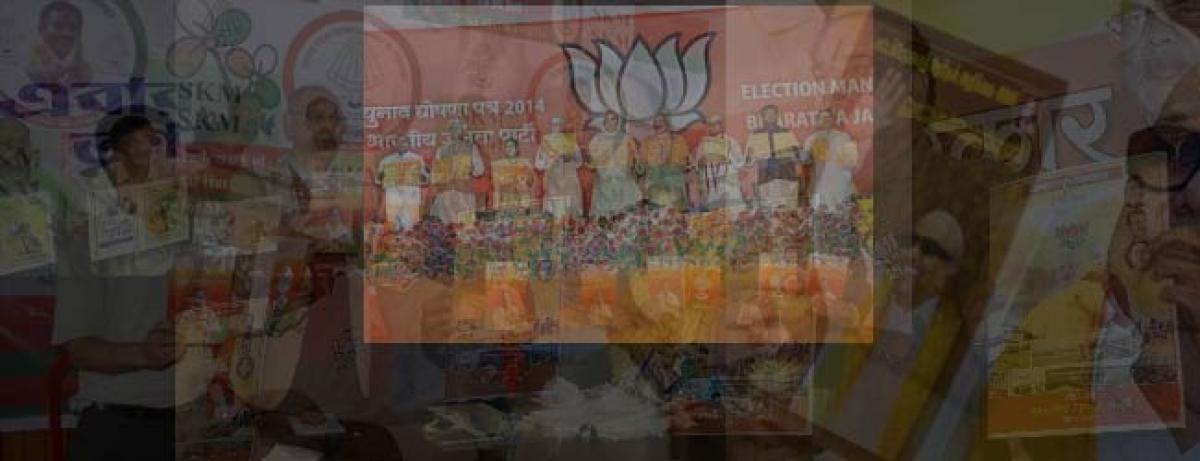Live
- Film actor Mohan Babu knocks High Court doors. Requests for anticipatory bail
- Allu Arjun Seeks Lunch Motion; Court Hearing Scheduled for 2 PM Today
- Vijayawada hosts Swarnandhra Vision-2047 Program to foster development in AP
- World Bank okays loan for new project to boost earnings of UP farmers
- Zomato gets GST tax demand notice of Rs 803 crore
- Atul Subhash suicide: No arrests made yet, says Bengaluru Police Commissioner
- Indian agrochemicals sector to see 7-9 pc growth next fiscal: Report
- SC refers to CJI Cong leader’s petition for verification of EVMs used in Haryana polls
- To become the youngest world champion is truly a great feat: Gill congratulates Gukesh
- Case Filed Against Allu Arjun Under Four Sections
Just In

Effective management of land erosion and water and promoting organic farming are some of the key features in sustainable development and ecological protection agenda showcased in manifestos by political parties,
Kolkata: Effective management of land erosion and water and promoting organic farming are some of the key features in sustainable development and ecological protection agenda showcased in manifestos by political parties, perhaps for the first time, in the fray for assembly elections in Assam, Kerala, Tamil Nadu, West Bengal, and the union territory of Puducherry.
Corresponding with the diversity of the pressing problems seen in these states - from the eastern Himalayas to the Western Ghats down south - the manifestos offer variety in terms of a wishlist for balancing development goals and impacts on the environment.
In Assam, home to the endangered one-horned rhino, the ruling Congress highlighted recovery through scientific research of land eaten away by the mighty Brahmaputra so that these areas could be used for industry and other purposes.
The opposition Bharatiya Janata Party (in an alliance with the Asom Gana Parishad and the Bodo People's Front) has in its vision document advocated enacting legislation to ensure protection of all water bodies in the state as well as preventing poaching of rhinos using latest technologies of electronic monitoring and preventing water pollution.
In West Bengal, cradling the Indian side of the Sundarbans mangroves under threat from climate change, the ruling Trinamool Congress has dedicated merely one line to environmental issues. It says in its manifesto: "Environmental issues will be tackled". It goes on to say "in-situ water preservation and regulated use of underground water would be looked into."
Pitted against it is the BJP and a tie-up of the Left Front and the Congress.
The Left Front talks about conserving biodiversity and tackling effluents from factories in its manifesto. It also focusses on generating awareness among the public on reducing use of plastic and non-biodegradables that impact environment and human health.
While stressing on encouraging organic farming, the BJP also harps on its pet aspiration to "actively implement the National Solar Mission thereby providing cheap and clean alternate energy to consumers".
In Kerala, plagued with pollution of the Periyar river, that originates in the remote forests of the famed Periyar Tiger Reserve, the ruling Congress-led United Democratic Front's manifesto has sought to bring the spotlight back on the rampant reclamation of water bodies, paddy fields and wetlands and the destruction of mangroves.
It has promised to implement a special package for environment protection of ecologically-sensitive areas, including paddy fields and wetlands. Subsidies for organic farming is also on its agenda.
In Tamil Nadu, the DMK, the leading opposition party, plans to bring to the table a proposal to prevent floods and provide training in organic farming under a scheme to be launched in the name of the late popular green crusader Nammazhvar.
According to Anumita Roychowdhury, executive director (Research and Advocacy) at New Delhi's Centre For Science and Environment (CSE), there is an increasing political articulation of environmental concerns and that, in many ways, is a reflection of what kind of mobilization has happened across the country on certain issues.
"It is also about how sharp public opinion is on these issues to which there has to be a political response. Water management has a very strong popular appeal because states are water stressed today and there is a recognition coming in.
"There is also the other side, of whether there is a move on the part of the political party itself to bring this on the agenda even if public opinion is not sharp enough," Roychowdhury told IANS.

© 2024 Hyderabad Media House Limited/The Hans India. All rights reserved. Powered by hocalwire.com







